新概念英语第一册-L67-the weekend
新概念英语第一册L67-68教案
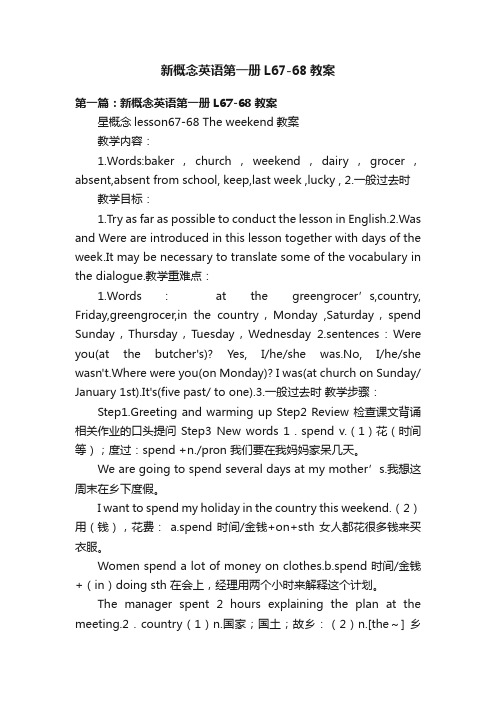
新概念英语第一册L67-68教案第一篇:新概念英语第一册L67-68教案星概念lesson67-68 The weekend教案教学内容:1.Words:baker,church,weekend,dairy,grocer,absent,absent from school, keep,last week ,lucky ,2.一般过去时教学目标:1.Try as far as possible to conduct the lesson in English.2.Was and Were are introduced in this lesson together with days of the week.It may be necessary to translate some of the vocabulary in the dialogue.教学重难点:1.Words:at the greengrocer’s,country, Friday,greengrocer,in the country,Monday ,Saturday,spend Sunday,Thursday,Tuesday,Wednesday2.sentences:Were you(at the butcher's)? Yes, I/he/she was.No, I/he/she wasn't.Where were you(on Monday)? I was(at church on Sunday/ January 1st).It's(five past/ to one).3.一般过去时教学步骤:Step1.Greeting and warming up Step2 Review 检查课文背诵相关作业的口头提问Step3 New words 1.spend v.(1)花(时间等);度过:spend +n./pron 我们要在我妈妈家呆几天。
Lesson 67-68 The weekend(课件)-新概念英语第一册

be动词的过去式
主语/时态 第一人称单数(I) 第三人称单数 (He, She, It)
现在时 am is
过去时 was
at the greengrocer’s
baker
/ˈbeɪkə/ n.
at the baker’s
at the greengrocer's (shop) at the grocer's at the hairdresser's
在蔬菜水果店 在杂货店 在理发店
at the doctor's (office) at my mother's (house)
Tuesday Friday weekend country baker grocer
Wednesday Saturday spend church keep greengrocer
Which one is appearing?
Saturday
absent country
weekend
greengrocer
Where were you on March 3rd? I was at...
Where were you on April 4th? I was...
Where were you on May 5th? I ...
Where was she on June 6th? She was at...
Friday /ˈfraɪdeɪ/
Saturday /ˈsætədeɪ/ Sunday /ˈsʌndeɪ/ weekend /ˌwiːkˈend/
新概念英语第一册第67-68课-The weekend
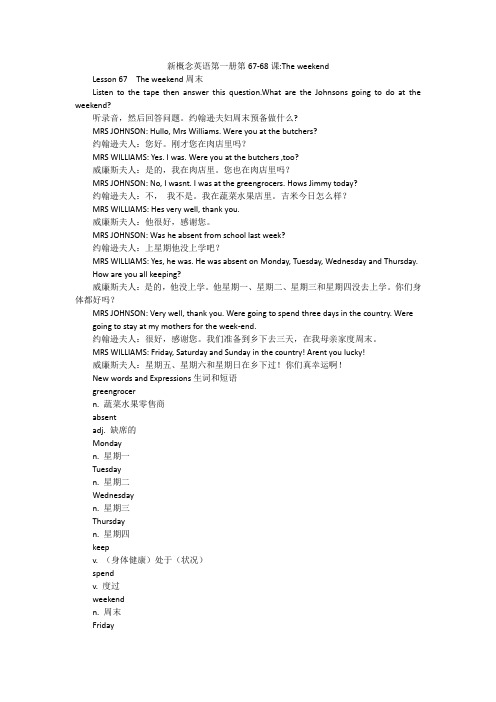
新概念英语第一册第67-68课:The weekendLesson 67 The weekend周末Listen to the tape then answer this question.What are the Johnsons going to do at the weekend?听录音,然后回答问题。
约翰逊夫妇周末预备做什么?MRS JOHNSON: Hullo, Mrs Williams. Were you at the butchers?约翰逊夫人:您好。
刚才您在肉店里吗?MRS WILLIAMS: Yes. I was. Were you at the butchers ,too?威廉斯夫人:是的,我在肉店里。
您也在肉店里吗?MRS JOHNSON: No, I wasnt. I was at the greengrocers. Hows Jimmy today?约翰逊夫人:不,我不是。
我在蔬菜水果店里。
吉米今日怎么样?MRS WILLIAMS: Hes very well, thank you.威廉斯夫人:他很好,感谢您。
MRS JOHNSON: Was he absent from school last week?约翰逊夫人:上星期他没上学吧?MRS WILLIAMS: Yes, he was. He was absent on Monday, Tuesday, Wednesday and Thursday.How are you all keeping?威廉斯夫人:是的,他没上学。
他星期一、星期二、星期三和星期四没去上学。
你们身体都好吗?MRS JOHNSON: Very well, thank you. Were going to spend three days in the country. Were going to stay at my mothers for the week-end.约翰逊夫人:很好,感谢您。
新概念Lesson-67-----The-weekend上课讲义

参加晚会。 反义词:present 出席,参加 Every employee must be present at the
meeting.每一位员工必须出席这个会议。
星期的表达
Monday Tuesday Wednesday Thursday Friday Saturday Sunday
weekday n. 平日(常指周一到周五的日子)
eg. My father is always busy in weekdays. 我爸爸平日总是很忙。
country
n. 乡村
country 1) n. 乡村,乡下 注意:country 当 “乡村,乡下”讲的时候,
前面必须用定冠词“the”;也可以说the countryside。
夫妇俩)
Now listen!
MRS.JOHNSON: Hello. Were you at the butcher’s?
MRS.WILLIAMS: Yes. I was. Were you at butcher’s, too?
MRS.JOHNSON: No, I wasn’t. I was at the greengrocer's. How's Jimmy today?
新概念英语 第一册
Hello! Everyone! I am Shannon.
Lesson 67 Tre you going to do at the weekend?
New Words and expressions 生词和短语
greengrocer absent Monday Tuesday Wednesday Thursday Keep
新概念英语第一册第67-68课-The weekend

新概念英语第一册第67-68课:The weekendLesson 67 The weekend周末Listen to the tape then answer this question.What are the Johnsons going to do at the weekend?听录音,然后回答问题。
约翰逊夫妇周末准备做什么?MRS JOHNSON: Hullo, Mrs Williams. Were you at the butcher's?约翰逊夫人:您好。
刚才您在肉店里吗?MRS WILLIAMS: Yes. I was. Were you at the butcher’s ,too?威廉斯夫人:是的,我在肉店里。
您也在肉店里吗?MRS JOHNSON: No, I wasn’t. I was at the greengrocer’s. How’s Jimmy today?约翰逊夫人:不,我不是。
我在蔬菜水果店里。
吉米今天怎么样?MRS WILLIAMS: He’s very well, thank you.威廉斯夫人:他很好,谢谢您。
MRS JOHNSON: Was he absent from school last week?约翰逊夫人:上星期他没上学吧?MRS WILLIAMS: Yes, he was. He was absent on Monday, Tuesday, Wednesday and Thursday.How are you all keeping?威廉斯夫人:是的,他没上学。
他星期一、星期二、星期三和星期四没去上学。
你们身体都好吗?MRS JOHNSON: Very well, thank you. We’re going to spend three daysin the country. We’regoing to stay at my mother’s for the week-end.约翰逊夫人:很好,谢谢您。
新概念英语第一册lesson67Theweekend

周末的重要性
放松身心:周末是放松身心的好时机,可以缓解工作压力和疲劳 家庭时光:周末是与家人共度时光的好机会,可以增进亲情和家庭关系 个人兴趣:周末可以用来追求个人兴趣和爱好,提升自己的技能和知识水平 社交活动:周末可以参加各种社交活动,结交新朋友,拓展人际关系
听录音模仿发 音和语调
练习听力和口 语表达
学习资源推荐
教材:新概念英语第一册lesson67Theweekend 视频教程:B站上有相关的教学视频,可以跟着老师学习 学习软件:扇贝单词、百词斩等APP上有新概念英语的单词和课文,可以随时随地学习 学习网站:新东方在线、沪江网校等网站上有新概念英语的教学课程,可以系统地学习
旅游观光:利用周末时间游览景点,了解当地文化,增强跨文化交流能力。
周末活动的实践案例分享
周末英语角:参加英语角活动,与母语人士交流,提高口语水平 英文电影赏析:观看适合英语初学者的英文电影,提高听力和语感 英语歌曲学习:学习简单的英文歌曲,培养英语学习兴趣 英语阅读:阅读适合英语初学者的英文故事或短篇小说,提高阅读能力
课文中的重点词汇和表达
重点词汇:周 末、公园、散 步、早晨、晚 上、享受、音 乐会、演奏、
钢琴、独奏
重点表达:在 公园散步,度 过一个愉快的 早晨和晚上; 参加音乐会, 欣赏演奏;形 容音乐会的气
氛和感受。
课文中的语法点
情态动词:本 课介绍了情态 动词"can"的用 法,表示能力
或可能性。
现在进行时: 课文中使用了 现在进行时, 表示正在进行 的动作或状态。
周末活动的种类
休闲娱乐活动: 看电影、听音乐、 玩游戏等
新概念英语第一册 第67课NCE1 lesson67 Gavin

Gavin交流YY群:9293585
单词讲解
be absent from… 缺席…,不参加… be absent from school 缺课 be absent from work 矿工
例如:Mary is absent from the party. 玛丽没有参加这个聚会 。
Lesson 67
Gavin交流YY群:9293585
单词讲解
Lesson 67
country
/ˈ kʌntri/ n. 乡村
【1】乡村 country life 乡村生活 乡村音乐 My grandparents live in the country. 我的祖父母在乡下。 We spend a good day in the country.
【2】国家 European countries 欧洲国家 France is a very beautiful country. 法国是一个非常漂亮的国家。
Gavin交流YY群:9293585
单词讲解
Leห้องสมุดไป่ตู้son 67
lucky
/ˈ lʌki/ adj. 幸运的
I am lucky to meet you in my life. 我今生邂逅你很幸运。
Gavin交流YY群:9293585
New Words & Pronunciations 生词及其发音
Lesson 67
bʊtʃə(r)/ n. 屠夫;屠户 butcher /ˈ ɡriːnɡrəʊsə(r)/n. 蔬菜水果零售商 greengrocer /ˈ æ bsənt/ adj. 缺席的 absent /ˈ /kiːp/ v. (身体健康)处于(状况) keep spend /spend/ v. 度过 kʌntri/ n. 乡村 country /ˈ lʌki/ adj. 幸运的 lucky /ˈ
新概念英语第一册-L67-the-weekend专题市公开课获奖课件省名师示范课获奖课件

一般目前时
❖ We are doing our housework now.
❖
正在
❖ The bus is leaving at 8:00.
进行
❖
时
❖ 主语+ be动词(was,were)+其他 ❖ 主语 + 实意动词旳过去式形式+其他 ❖ (实意动词:有确切含义旳动词,能够单独做谓语,
如:played等)
morning
yesterday afternoon
evening
the day before yesterday
4.与one 连用: morning evening
one day
Monday afternoon
5.与that 连用:
that
morning winter day year
6.其他时间状语:
Children spend a lot of time on Internet. 孩子 们花费诸多时间上网。
spend 时间/金钱 +(in) doing sth.
The manager spent 2 hours(in) explaining the plan at the meeting. 在会上,经理用两个小时来解释这个计划
他在城里住了将近三十年,可还是土气十足。
★ lucky adj. 幸运旳
[ˈlʌki] ① adj. 有好运旳,幸运旳
She was lucky to get such a well-paid job. 她能得到这么一种酬劳优厚旳工作真幸运。
② adj. 侥幸旳,恰巧旳
He didn’t really know the answer - it was just a lucky guess.
新概念英语第一册Lesson6768Theweekend小学英语初中英语全国通用
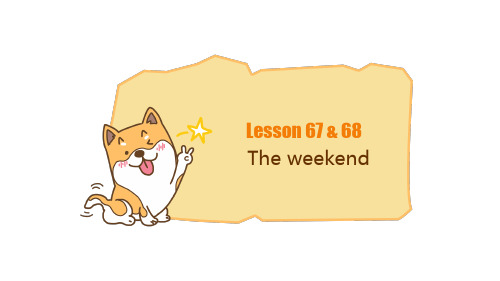
[ˈdeəri]
Vocabulary
词汇精讲
baker
n. 面包师傅
[ei]
A baker is a person whose job is to bake and sell bread, and cakes.
— When was he / Tom at the hairdresser's? — He was at the hairdresser's on Wednesday.
Language Point
语句讲解、课文讲解
同学们 , 请对照教材听老师讲解!
absent : adj. 缺席的,不在的 没去上学 : sb. is absent from school.
Vocabulary
词汇精讲
weekend
n. 周末
weekend : 周末 (rest) ↔ weekdays : 工作日(work) e.g. How do you spend your weekend?
你周末时间怎么打发?
spend : v. 花费(时间 , 金钱) How about going shopping this weekend? 这周末一起去逛街购物怎么样?
介词at + 定冠词the + 表示职业 , 身份的人's (所有格)
Language Point
语句讲解、课文讲解
表示地点 , 有些需要用定冠词the,有些不需要。 e.g. at the office : 在办公室
in the country : 在乡下 at the butcher's : 在肉店
Lesson 67 The weekend(课件)新概念英语第一册
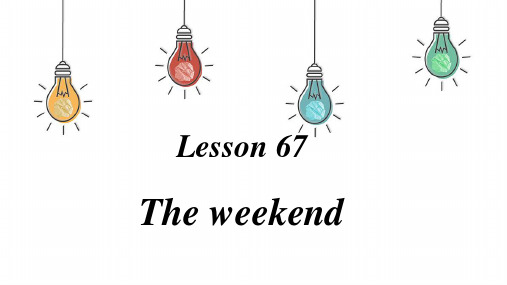
• 2.他上周没去上学吗? • Was he absent from school last week? • 3.How are you (all) keeping? • =How are you. • 4.I am going to spend three days in the country. • 【一般将来时:主语+be going to +V.原】 • 5.Aren't you lucky!【否定疑问句 用来强调】
n.蔬菜水果零售商 a.缺席的 v.处于...状况 v.度过 n .乡村 a.幸运的
• greengrocer • absent • Monday • Tuesday • Wednesday • Thursday • keep • spend • weekend • Friday • Saturday • Sunday • country • lucky
Lesson 67
The weekend
greengrocaebrsent Monday
Monday
TuesdayWednesdaTyhursday
TWuhedeunrsesdsddaaayy
kweeepkendspend
Friday Saturday Sunday
SaFStruuindrdadayayy
补全课文(七选五)A: Hello! Were you at the butcher's? B: ①___________________________ Were you at the butcher's
too?A: No, I wasn't. I was at the greengrocer's. How is Jimmy today?B: ②___________________________A: Was he absent from school last week?B: ③___________________________ He was
(精品)新概念英语第一册lesson67-68
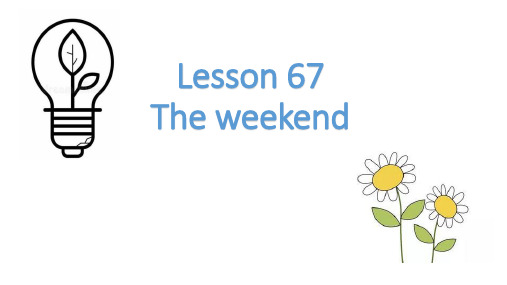
✲ and连接几个词语时,
How are you all keeping?and前升调,后降调。
✲ = How are you ?
✲ all 是代词,表示“所有”。 用来指3个或3个以上的人和事物
♣ MRS.JOHNSON:
Very well, thank you.
✲ 主语 + be动词 + going to + 动原:
practice练习 (把下列句子变成过去式、否定、及疑问句)
1. I am at the grocer’s. 2. They are at the dairy’s. 3. Penny is at the baker’s. 4. Tom is at the hairdresser’s. 5. Jerry is at his mother’s. 6. She is in hospital. 7. He is at church. 8.You are at school. 9.Tom is in the room.
✲ be (动词) absent from: 缺席
✲ wlaeset:k:上周一个
(1)You were absent from ✲ last week:上周
school yesterday. (2)She was absent from
last month:上月
the meeting.
★ MRS.WILLIAMS: Yes, he was. He was absent on Monday, Tuesday, Wednesday and Thursday.
What are the Johnsons
going to do at the weekend?
新概念一册 lesson67

语言点
• 疑问句:be 动词过去式提前并大写 原大写字母小写 后面顺序不变照抄 句号变问号 • 例句:他以前是个好孩子么? Was he a good boy? • 回答: Yes,he was. No,he wasn’t .
新概念一册 Class A&B
Lesson67 The weekend
词汇
• Greengrocer 菜市场
食杂店,杂货铺 卖绿色产品的地方,因此是蔬菜水果市场
词汇
• A场) Ab- 否定前缀,一般表示“不” Sent 有“送”的意思 不送了,所以就不来了,就是缺席
词汇
• 周一 Monday • 周二 Tuesday • 周三 Wednesday • 周四 Thursday • 周五 Friday • 周六 Saturday • 周日 Sunday
on
词汇
补充: • Weekday 工作日 • Weekend 周末
词汇
• Keep v. 1. 处于……状态 keep warm 保持温暖 2. 保存,养 keep a dog 养小狗 用法:keep + 物品 保管好,保存好……东 西 keep + doing 保持……动作
词汇
• Lucky a.幸运的,侥幸的 Lucky dog 幸运儿 Lucky! 太幸运了! Good luck! 祝你好运。
语言点
• 一般过去时 表示过去发生的事
过去时 将来时
最重要特征: 动词发生变化 is was be动词 am was are were 现在是 以前是
新概念英语67课讲义
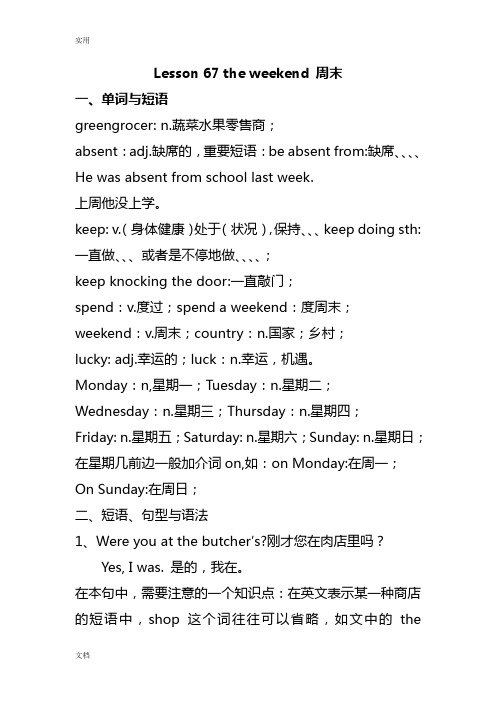
Lesson 67 the weekend 周末一、单词与短语greengrocer: n.蔬菜水果零售商;absent:adj.缺席的,重要短语:be absent from:缺席、、、、He was absent from school last week.上周他没上学。
keep: v.(身体健康)处于(状况),保持、、、keep doing sth:一直做、、、或者是不停地做、、、、;keep knocking the door:一直敲门;spend:v.度过;spend a weekend:度周末;weekend:v.周末;country:n.国家;乡村;lucky: adj.幸运的;luck:n.幸运,机遇。
Monday:n,星期一;Tuesday:n.星期二;Wednesday:n.星期三;Thursday:n.星期四;Friday: n.星期五;Saturday: n.星期六;Sunday: n.星期日;在星期几前边一般加介词on,如:on Monday:在周一;On Sunday:在周日;二、短语、句型与语法1、Were you at the butcher′s?刚才您在肉店里吗?Yes, I was. 是的,我在。
在本句中,需要注意的一个知识点:在英文表示某一种商店的短语中,shop这个词往往可以省略,如文中的thebutcher′s 其实就是the butcher′s shop的省略,另外像文中的the greengrocer′s 其实就是the greengrocer′s shop 的省略,另外的例子还有the hairdresser′s (shop )等等,shop 的省略不影响句义,就是一种表达的习惯。
2、how is jimmy today?吉米今天怎么样?在本句中我们继续复习关于询问人或事物状况的几个重要的句型:How is/are+主语、、、怎么样?例:How are you today?你今天可好?How is Tom today?汤姆今天可好?另外What is the matter with、、、?经常用来询问人和事物的状况,常作“是否有问题”“是否有麻烦讲”例如:What is the matter with Tom?汤姆怎么了啊?What is the matter with this bike?这辆自行车怎么了啊?What is the matter with the book?这本书怎么了?3、Was he absent from school last week?上周他没上学吧?在本句中需要掌握一个重点短语的用法:be absent from:缺席、、、例:He is absent from the meeting since he is ill.他今天缺席会议是因为他病了。
新概念一LL67-68

一提( was/were提前) 二变(变大小写/人称) 三问号(句末加?) 回答:谁问谁答
Practice
Practice
Practice
1. There _____ more than forty people at the meeting.
A. were B. was C. wasn‘t
D. weren't
Where are you today?e
Where are you going to do tomorrow?e
Where were you yesterday?e
一般过去时
一般过去时
He was absent from school last week. He was a worker two years ago. Lu Xun was a great writer.
Try to say the words
/'wenzdi/
/'tju:zdi/
/'fraidi/
/ˈdeəri/
/'lʌki/
/spend/
/'æbsnt/
/ki:p/
/'gri:n'grəusə/
/'sætədi/
New Words
Type Writer on the Wall
Part2 Text
at the baker's 在面包店 I'm just going to the baker's.
dairy /ˈdeəri/ n.牛奶场;乳品场
复数: dairies We buy milk at the dairy. 我们在乳品店买牛奶。 Go and buy me some cheese at the dairy. 去乳品店帮我买些奶酪。
新概念英语第一册第67课
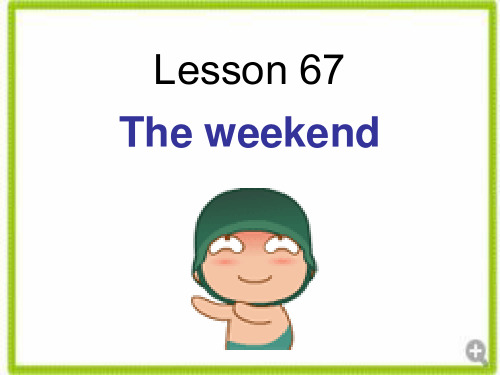
一般过去时
• 一般过去时(simple past tense)表示过去 某个时间里发生的动作或存在的状态,常 和表示过去的时间状语连用,如yesterday, last night,in 1990,two days ago等。 • 一般过去时也表示过去经常或反复发生的 动作,常和often,always等表式频率的时 间状语连用。
一般现在时
一般过去时
is , am are
→ →
was were
一般过去时结构
含有be动词(过去的状态)
肯:主语+was/were +其他. 否:主语+wasn’t/weren’t +其他. 疑:Was/Were +主语+ 其他? 答:Yes,主语+was/were. No, 主语+wasn’t / weren’t.
absent adj. 缺席的
• • • • • be absent from 上星期她没去上学吧? Was she absent from school? 我昨天没上班。 I was absent from work yesterday.
keep
v.
身体处于…状态,保持
• How are you all keeping? • How is your mother keeping? • Please keep the door open.
规则变化的动词过去式
1 直接加ed: work—worked look—looked 2 以不发音e结尾的单词,直接加d: live —lived use—used, 3 以辅音字母+y结尾的,变y为i加ed: study— studied carry—carried 4以元音字母+y结尾的,直接加ed: enjoy —enjoyed play—played 5 以重读闭音节结尾的,双写+ed: stop— stopped plan—planned
新概念第一册 Lesson 67-68

否定疑问句
Aren’t you lucky! 你们真幸运啊! 否定疑问句形式的感叹句,为的是加强语气。尽管形式时否定的, 但表示强有力的肯定。
参考译文
约翰逊夫人:您好。刚才您在肉店里吗? 威廉斯夫人:是的,我在肉店里。您也在肉店里吗? 约翰逊夫人:不,我不是。我在蔬菜水果店里。吉米今天怎么样? 威廉斯夫人:他很好,谢谢您。 约翰逊夫人:上星期他没上学吧? 威廉斯夫人:是的,他没上学。他星期一/星期二/星期三和星期四没去上学。
keep
keep /kiːp/ v. (身体健康)处于(状况) keep doing sth (something) 持续做某事
spend
spend /spend/ v. 度过,花费 spend time(money)on sth spend time(money)in doing sth 花时间(钱)在某事上/做某事
一般过去时(simple past tense)表示过去某个时间里发生的动作或状态; 过去习惯性、经常性的动作、行为。 be动词的一般过去时: 肯定句:主语+be动词的过去式+表语 be动词的过去式不规则:am, is – was (过去式); are - were (过去式)
e.g. I was at the greengrocer’s. 否定句:主语+was(were) not +表语
你们身体都好吗? 约翰逊夫人:很好,谢谢您。我们打算到乡下去三天,在我母亲家度周末。 威廉斯夫人:星期五、星期六和星期日在乡下过!你们真幸运啊!
Role-play
MRS.JOHNSON: Hello. Were you ___ the butcher’s? MRS.WILLIAMS: Yes, I was. Were you at the butcher’s, too? MRS.JOHNSON: No, I wasn’t. I was at the ________. ____’s Jimmy today? MRS.WILLIAMS: He’s very ___, thank you. MRS.JOHNSON: Was he absent _____ school last week? MRS.WILLIAMS: Yes, he was. He was absent ___ Monday, Tuesday, Wednesday
- 1、下载文档前请自行甄别文档内容的完整性,平台不提供额外的编辑、内容补充、找答案等附加服务。
- 2、"仅部分预览"的文档,不可在线预览部分如存在完整性等问题,可反馈申请退款(可完整预览的文档不适用该条件!)。
- 3、如文档侵犯您的权益,请联系客服反馈,我们会尽快为您处理(人工客服工作时间:9:00-18:30)。
1.一般过去时
描述过去的事实或状态,描述过去的 动作。在英语中,非现在的以前都叫过去。 过去发生的而现在已经结束的动作要用一般 过去时来表示。
1、表示过去某个点上特定的时间存在的状 态,事实,或发生的动作。
2、表示在过去的一段时间内经常发生的动 作或反复的习惯。
例如: ❖ They were happy. ❖ We didn’t have breakfast this morning. ❖ He played football. ❖ You did your homework.
动词的过去式变化规则
❖ 1、一般的动词后面直接加-ed
① 清辅音后面加ed,读[t]
just now in the old days in those days in 1980 the other day at that time once upon a time
一般过去时的构成
所有时态都是通过动词变化来表现的
❖ E.g. ❖ You are right.
❖
❖ I want to go to school.
spend,cost,afford,take,pay的区别
• cost 物做主语,表示物的售价 I bought a new necklace, it costs
me 2000 dollars.
我买了一条新项链,花了我2000美元
• afford 人作主语,支付得起,腾出时 间 I can’t afford it.
立的国家。
② n. 乡下,乡村
country表示“农村”时,
前面一定要加定冠词the
③ adj. 乡下的;乡村风味的
I prefer country life to life in the city. 乡村生活与城市生活相比,我更喜欢乡村生活。
After nearly thirty years in the city, he’s still country.
• Mrs.Johnson:Hello. Were you at the butcher’s?
mother’s. 我们要在我妈妈家呆几天。
I want to spend my holiday in the country this weekend.
我想这周末在乡下度假。
② v. 用(钱),花费 spend 时间/金钱 + on +sth.
Women spend a lot of money on clothes.女人都 花很多钱来买衣服
一般现在时
❖ We are doing our housework now.
❖
正在
❖ The bus is leaving at 8:00.
进行
❖
时
❖ 主语+ be动词(was,were)+其他 ❖ 主语 + 实意动词的过去式形式+其他 ❖ (实意动词:有确切含义的动词,可以单独做谓语,
如:played等)
4. 总经理参加了今天下午的会议。
Our General Manager attended the meeting this afternoon.
用括号里动词的适当形式填空。
1. He ____r_e_a_d___ (read) that book last week. 2. Last night he __a_r_r_iv__e_d___ (arrive) just in time for the show. 3. Mary _m___a_r_r_ie_d___ (marry) Thomas yesterday. 4. Tom _s_h_o_w__e__d___ (show) us where to sit at the meeting yesterday. 5. Last summer we ____v__is_i_t_e_d_ (visit) Uncle Jack. 6. It ____r_a_i_n_e_d__ (rain) almost every day last month. 7. John __l_ik__e_d_ (like) to play piano when he was in secondary school. 8. Betty __w__o_r_k__e_d__ (work) hard all last year. 9. We __c_h__a_n_g_e_d__ (change) the color of our uniforms last Christmas.
10. Last year Cindy _______b_o__u_g(hbtuy) her mother a pretty watch for her
birthday.
New Words
greengrocer [ˈɡri:nɡrəusə] absent [ˈæ bsənt] Monday [ˈmʌndi] Tuesday [ˈtju:zdi] Wednesday [ˈwenzdi] Thursday [ˈθə:zdi] keep [ki:p]
要特殊记忆。
❖ am/is-was, ❖ go-went, ❖ eat-ate, ❖ buy-bought, ❖ think-thought ❖ teach-taught, ❖ hurt-hurt, ❖ win-won,
are-were, do-did swim-swam, bring-brought, see-saw, fall-fell, break-broke, lose-lost
v. 度过 n. 周末
n. 星期五 n. 星期六
n. 星期日 n. 乡村 adj. 幸运的
★ greengrocer [ˈɡri:nɡrəusə] n. 蔬菜水果零售商
在英文中,表示店铺、住宅、公共机构、公共 建筑物以及教堂的名字或某人家时,
名词所有格后常不出现它所修饰的名词: at the greengrocer's
asked
② 浊辅音或元音后面加ed,读[d] cleaned
③ d/t +ed [id]
dusted
❖ 2、以不发音的字母e结尾的动词,直 接加d。 hoped,lived, believed
❖ 3、辅音字母加y结尾的单词,要把y变 i加ed studied,worried,
5、有些动词不符合上面的规则,需
在蔬菜水果店
greengrocer greengrocer’s
/ˈɡri:nɡrəusə/
butcher
/butʃə/
butcher’s
at the butcher's 在肉店里 at the dentist's 在牙医的诊所 at the hairdresser's 在理发店 at the stationer's 在文具店 at my mother's 在我妈妈家
Children spend a lot of time on Internet. 孩子 们花费很多时间上网。
spend 时间/金钱 +(in) doing sth.
The manager spent 2 hours(in) explaining the plan at the meeting. 在会上,经理用两个小时来解释这个计划
I am going to stay at my mother's this Friday.
这周五我将在我妈妈家住。
They are going to stay at her grandfather's this weekend.
他们这周末要在她爷爷家住。
★ absent adj. 缺席的
[ˈæ bsənt]
I paid him for the rent. 我付给他房租
★ country [ˈkʌntri]
n. 乡村
① n. 国家;国土;故乡
India, a former British colony, is now a
fully independent country.
曾一度为英国殖民地的印度如今已是一个完全独
他并非真知道答案——那不过是个侥幸的猜 测。
It’s lucky he’s here. 他碰巧在这儿 。
Lucky dog That’s my destiny.
Listen,Read and answer questions
Mrs.Johnson
Mrs.Williams
1.Was Mrs.Johnson at the butcher’s? 2.Where was she? 3.Who was at the butcher’s?
n. 蔬菜水果零售商 adj. 缺席的 n. 星期一 n. 星期二
n. 星期三 n. 星期四 v. (身体健康)处于(状况)
spend [spend] weekend [ˌwi:kˈend] Friday [ˈfraidi] Saturday [ˈsæ tədi] Sunday [ˈsʌndi] country [ˈkʌntri] lucky [ˈlʌki]
用于一般过去时的时间状语
1.与a
three hours
five days
ago
one week
six months
four years
2.与last 连用
time night
week
last month
term
3.与yesterday 连用:Monday
他保不住自己的工作了。
3)保存,保管
Would you keep my things for me while I’m away?
当我离开的时候,你能为我保管一下我的东西吗?
